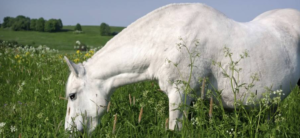 Starch and Inflammation: Considerations for Old and Overweight Horses. Body-wide inflammation contributes to the development of acute and chronic diseases in horses such as laminitis or metabolic syndrome. High-starch meals appear to induce inflammatory responses in certain young, old, and overweight horses. However, at differing time points and severities.
Starch and Inflammation: Considerations for Old and Overweight Horses. Body-wide inflammation contributes to the development of acute and chronic diseases in horses such as laminitis or metabolic syndrome. High-starch meals appear to induce inflammatory responses in certain young, old, and overweight horses. However, at differing time points and severities.
Research:
Researchers at Sam Houston University recently explored the pro-inflammatory responses of middle-aged versus old horses. As well as lean versus overweight horses following meals rich in nonstructural carbohydrates (NSC).* Steam-rolled barley fed horses at a rate to provide 1.2 grams of NSC per kilogram of body weight daily. In addition, they received grass hay, ration balancer, salt, and water.
Inflammation was evaluated at various time points in the study by measuring blood levels of the inflammatory mediator interleukin (IL)-1β.
When considering the effect of body condition in middle-aged horses, overconditioning—a body condition score between 6.5 and 8 on a 9-point scale—was associated with an immediate postprandial increase in IL-1β on day 1. In contrast, leaner horses with a body condition score of 4 or 5 did not have this increase in IL-1β until 14 days after being fed the high-starch diet. Further, older horses between 20 and 23 years of age also had increased IL-1β levels directly after consuming the high-starch diet.
“This study builds on previous work that assessed pro-inflammatory response to diet. Older and overweight horses have a more immediate and elevated inflammatory response, which could be linked to underlying conditions such as the inflammaging process,” explained Catherine Whitehouse, M.S., a nutritionist for Kentucky Equine Research.
Feeding Management:
Given the results of this study, the feeding management of older and overconditioned individuals should emphasize lower nonstructural carbohydrate intakes. This is according to the researchers.
Take care in how calories are provided to horses on low-starch diets. “High-fat diets could also result in similar immune responses depending on the fatty acid composition of the diet. Kentucky Equine Research continues to conduct research on how long-chain omega-3 fatty acids, such as those found in EO-3, can reduce the production of pro-inflammatory eicosanoids and cytokines, which are inflammatory mediators,” Whitehouse said.
In conclusion, North Fulton Feed can help you learn more about Considerations for Old and Overweight Horses. Visit us! We are open Monday – Friday: 8 a.m. to 6 p.m. and Saturday: 8 a.m. to 5 p.m. You can also contact us by phone at (770) 475-5572.
Resources:
Article by: Kentucky Equine Research
*Suagee-Bedore, J., N. Shost, C. Miller, L. Grado, and J. Bechelli. 2021. Age and body condition influence the post-prandial interleukin-1β response to a high-starch meal in horses. Animals (Basel) 11(12):3362.
